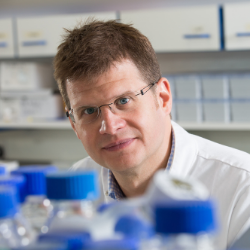The role of respiratory viruses in lung remodelling and chronic lung disease
Understanding the role of viral infection and innate immune responses in fibrosis and lung disease development and progression using sophisticated cell culture systems.
Start date
1 October 2023Duration
3.5 yearsApplication deadline
Funding source
FHMS, University of SurreyFunding information
A stipend of £17,668 per annum and fees (UK home students only)
About
The lungs are constantly exposed to external stimuli and pathogens, as such, they are vulnerable to infection and injury. Lower respiratory tract infections are one of the leading causes of morbidity and mortality, resulting in over 2 million deaths worldwide each year. Respiratory infections predispose individuals to chronic respiratory diseases as they age. An estimated 545 million people worldwide suffer from chronic respiratory diseases including asthma, chronic obstructive pulmonary disease (COPD) and idiopathic pulmonary fibrosis (IPF).
The mechanisms underlying the development and progression of chronic lung disease are poorly understood. Mounting evidence highlights the importance of respiratory viruses in the pathogenesis and exacerbation of chronic lung disease.
This research will explore the role of respiratory virus infection in lung remodelling, a hallmark of many chronic lung diseases, which includes structural changes such as subepithelial fibrosis, an increase in smooth muscle mass and mucous metaplasia. Respiratory syncytial virus (RSV), one of the most ubiquitous respiratory viruses with a known association to asthma development, and SARS-CoV-2 which has been noted to cause fibrosis in fatal cases of COVID-19, will be studied in parallel. Novel cell culture models incorporating primary airway epithelial cells and other pulmonary cell types will be exploited to understand tissue microenvironments and cellular crosstalk during respiratory virus infection.
This is a fully funded 3.5 year PhD. The successful candidate will employ a wide range of techniques in cell biology, molecular biology, innate immunology and virology.
Eligibility criteria
Open to UK candidates starting in October 2023.
You will need to meet the minimum entry requirements for our Biosciences and Medicine PhD programme.
Applicants are expected to have a good honours degree (first or upper second) or a master’s degree in an appropriate discipline.
English language requirements
IELTS Academic: 6.5 overall with 6.0 in writing, or equivalent.
How to apply
Applications should be submitted via the Biosciences and Medicine PhD programme page. In place of a research proposal, you should upload a document stating the title of the project that you wish to apply for and the name of the relevant supervisor.
Once you have completed and submitted your application, please send an email to Dr Lindsay Broadbent (l.broadbent@surrey.ac.uk) confirming you have applied.
Studentship FAQs
Read our studentship FAQs to find out more about applying and funding.
Application deadline
Contact details
Lindsay Broadbent

Studentships at Surrey
We have a wide range of studentship opportunities available.

